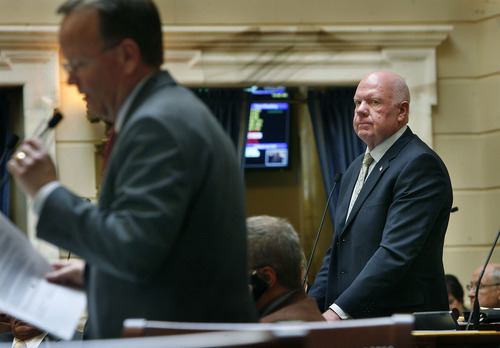This is an archived article that was published on sltrib.com in 2011, and information in the article may be outdated. It is provided only for personal research purposes and may not be reprinted.
A proposal to double the sales tax on food and offset it by reducing sales tax on other purchases passed the Senate, despite complaints from some — including Senate President Michael Waddoups — that the bill would be a tax hike on Utah's poor.
In 2006 and 2007, then-Gov. Jon Huntsman Jr. led an effort to cut the state's sales tax rate on food from 4.75 percent to 1.75 percent.
But SB270, sponsored by Sen. Stuart Adams, R-Layton, would set the state tax rate at 4.35 on all goods, more than doubling the sales tax on food and cutting the rate on other goods.
The overall impact would be a slight reduction in total sales tax collected. Adams argues that when the economy soured, sales tax receipts dropped sharply because households ratcheted down their spending.
Restoring the sales tax on food would stabilize that revenue stream, Adams says, because people have to buy food.
"We're running our state on sales tax only, so it's a very volatile tax and we made it more volatile by taking the food out of the base," Adams said. "This may not be politically correct … but it is financially correct. It is the right thing for the state of Utah and the right thing for our future."
Waddoups, R-Taylorsville, who for years sponsored legislation to do away with the sales tax on food, voted against Adams' bill, saying it would be a disproportionate burden on low-income Utahns.
"This is obviously going to be a tax cut that benefits those who are most able to pay," said Waddoups. "I still believe, and my constituents I've heard from who are writing to me, say this is going to impact them."
And Senate Minority Leader Ross Romero, D-Salt Lake City, said that lowering the general sales tax wouldn't change the fact that everyone will pay more at the grocery store.
"This is a tax increase on everybody because it's a tax on food," he said. "If you are eating food and buying food, you are paying for it and it is an increase."
House Majority Leader Brad Dee, R-Ogden, said the House has had only a brief discussion about the sales tax on food during its caucus meeting. "I don't see a lot of love for it," Dee said.
Back in the Senate, Adams argued claims that the tax change would hit poor people harder are "flat-out unfounded."
According to a report by the Tax Review Commission, that may be true from a pure dollar standpoint. A family of four that makes less than $20,000 per year would pay an additional $240 in tax, while a family that makes between $50,000 and $70,000 would pay $310.
But because low-income Utahns spend a greater percentage of their total income on food, an increase in tax hits them proportionately harder, the commission said. The family making less than $20,000 spends 15 percent of its income on food, while the figure is just over 5 percent for the higher-income family.
"Low-income people spend the majority of their paycheck, after rent and utilities, on food," said Linda Hilton, a low-income advocate with the Coalition of Religious Communities. "They are not buying $3,000 dining room sets. They aren't buying a bunch of jewelry. So lowering the tax rate on those items is a tax break for the rich."
The commission said that lowering the sales tax on food was an inefficient way to help low-income families and there were more targeted approaches that would be more effective. Several other proposals would seek to help the poor absorb the sales tax increase by giving low-income taxpayers a tax credit to offset the additional cost.
But Hilton said that only helps if individuals file income taxes, so it wouldn't help people on Social Security, disability or unemployment who have no taxable income.
Adams said he will leave that to others whether to give breaks to low-income individuals; his aim was to stabilize revenues. —
Food tax
Utah is one of just seven states that impose any state levy on food.
If the bill to increase the current food tax rate of 1.75 percent to 4.35 percent were approved, Utah would have the second highest rate in the nation, second only to Tennessee.
(The figures do not include six states that tax food but grant a rebate or tax credit to low-income residents).
Source: Federation of Tax Administrators, Februrary 2010



